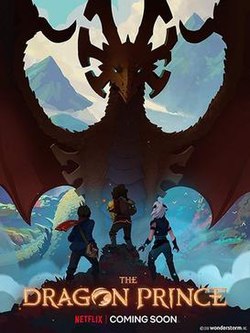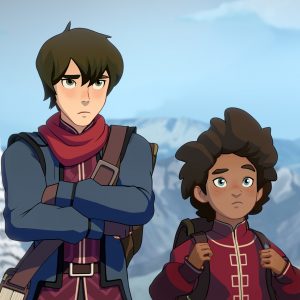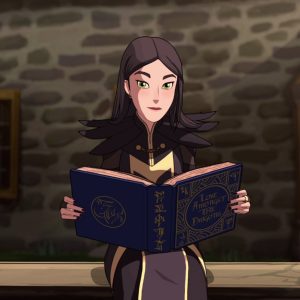(AKA “Asking Someone Not to Have to Make a Choice is Still a Choice”)
 It’s actually become a critical trope in and of itself to say there are no new stories (in other words, every tale is simply made up of well-known narrative techniques). I’ve never been a fan of such over-generalizing, but it is worth noting how a newly created movie or book makes use of all the stories that have come before it. Some can approach things in such a fresh way that they seem completely unlike anything before, much like The Lord of the Rings and Star Wars: A New Hope did when they first arrived. And others can seem hopelessly imitative, like Eragon: it’s still an impressive story for a teenager to write, but the patchwork quilt of its influences is mighty noticeable.
It’s actually become a critical trope in and of itself to say there are no new stories (in other words, every tale is simply made up of well-known narrative techniques). I’ve never been a fan of such over-generalizing, but it is worth noting how a newly created movie or book makes use of all the stories that have come before it. Some can approach things in such a fresh way that they seem completely unlike anything before, much like The Lord of the Rings and Star Wars: A New Hope did when they first arrived. And others can seem hopelessly imitative, like Eragon: it’s still an impressive story for a teenager to write, but the patchwork quilt of its influences is mighty noticeable.
Other stories have such fun with their influences and take them in a powerful enough direction that you don’t much care how standard some of its base elements are. The visuals of The Dragon Prince will be familiar to any watcher of well-known fantasy tales (the Moon Elf kingdom looks a lot like Lothlorien in The Fellowship of the Ring, or the realm of The Night Elves from World of Warcraft), and Frederik Wiedmann’s score would feel right at home in the world of Middle Earth as envisioned by Peter Jackson and co.
 What makes The Dragon Prince such a standout for everyone to watch (it is NOT just a children’s animated series, no matter how much the Daytime Emmy’s want it to be) is how it takes these familiar elements in powerful new directions. One in particular that stands out from many previous fantasy films and shows is its inclusivity: Humans and elves are drawn in ways that will remind viewers from this reality of various Earth cultures and regions, but no one in the world of The Dragon Prince notices or makes a comment about another person’s accent or skin tone. That’s just how they look.
What makes The Dragon Prince such a standout for everyone to watch (it is NOT just a children’s animated series, no matter how much the Daytime Emmy’s want it to be) is how it takes these familiar elements in powerful new directions. One in particular that stands out from many previous fantasy films and shows is its inclusivity: Humans and elves are drawn in ways that will remind viewers from this reality of various Earth cultures and regions, but no one in the world of The Dragon Prince notices or makes a comment about another person’s accent or skin tone. That’s just how they look.
Instead, the show uses the very real divisions between the humans and magical creatures of its universe (e.g., elves and dragons) to probe at problems that will very much remind a viewer of our own world. Disgusted and horrified by how some humans gained magical abilities, dragons and elves have banished all of humanity to the non-magical half of their shared continent.
While this action is understandable (human wizards gained their abilities from Dark Magic, which derives its power from the life force of a magical creature: a process that generally means killing the creature for its body parts), there is an element of elitism and arrogance to how dragons and elves treat humans. “You weren’t happy with what you were given,” is a line said in varying ways throughout the show when Dark Magic is brought up. Humans bristling at this separate but not equal treatment is easy for a viewer to appreciate, even if Dark Magic is clearly unsavory and unethical (though its practitioners don’t necessarily see it that way).
 Probably the most powerful statement the show creates from its familiar elements is about choice: why are you doing what you are doing, and to what end? Not thinking about the true end of their choices is a consistent problem for its characters, and sets up the crux of the storyline for the show’s three seasons. At its beginning, a group of elvish assassins have been sent to kill a human king and his heir, the human king having himself killed the King of the Dragons previously (out of revenge for the death of someone else). As the viewer learns more, they begin to see that this is just the most recent in a long history of humans and magical creatures pursuing vengeance or power (the one sometimes mistaken for or blended with the other).
Probably the most powerful statement the show creates from its familiar elements is about choice: why are you doing what you are doing, and to what end? Not thinking about the true end of their choices is a consistent problem for its characters, and sets up the crux of the storyline for the show’s three seasons. At its beginning, a group of elvish assassins have been sent to kill a human king and his heir, the human king having himself killed the King of the Dragons previously (out of revenge for the death of someone else). As the viewer learns more, they begin to see that this is just the most recent in a long history of humans and magical creatures pursuing vengeance or power (the one sometimes mistaken for or blended with the other).
Perhaps the most heartbreaking commentary on choice comes through two clear decisions made by one of its characters. At both times, the character wants to avoid the decision: the pain of choosing one direction or another is too great. And at both times, the show’s statement is clear: avoiding a decision is still a choice, in and of itself.
A powerful reminder to viewers from our world, where choosing not to know something is a statement (and a choice) all of its own.
